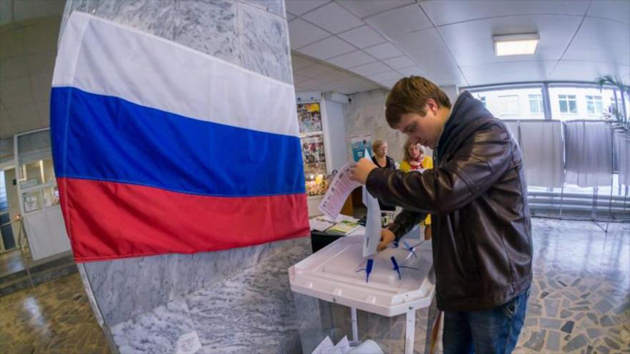Image From Noticias 24
The first round of the Russian presidential elections are being held today, in which 108.9 million electors in Russian territory and 1.87 million abroad have been called to vote. They will be choosing among 8 candidates, including the current head of state, Vladimir Putin, whose victory is practically certain, according to opinion polls.
In spite of the number of candidates, none of them have reached a two-digit figure in voting intention polls.
The only candidate who, according to some analysts, could have garnered greater support is attorney and blogger Alexéi Navalny, whose candidacy was rejected by the Electoral Commission for having been sentenced to 5 years in prison for embezzlement of public funds.
Nalvany, who considers the sentence to have been the result of political persecution by the Kremlin, has called electors to abstain from voting and seeks to capitalize on the low voter turnout. 65% of electors voted in the 2012 elections, while voter abstention in the 2016 legislative elections was over 50%.
Although his victory is practically guaranteed, these elections are being held in a sensitive international context for the Russian president, due to increasing tensions with the main world powers.
Putin thus ended his campaign with a vigorous call for electors to head to the polls today. This call could be interpreted as reaction to the possibility of a very low voter turnout that would undermine the legitimacy of his victory.
“The course that the country will take will depend on the will of the people, the will of each Russian citizen. That is why I ask you to go to the ballot stations on Sunday. Exercise your right to choose the future of our great and beloved Russia,” said Putin in a video.
According to the last polls, Putin will win with 65-70% of the votes, a historic result for the Russian leader, who was elected for the first time in 2000 and re-elected in 2004 and 2012, a period during which he served as Prime Minister for four years (2008-2012).
The Prime Minister, Dmitri Medvedev, known for his interest in social media, also called the youth to “get off the Internet” today.
Unrivaled
The final stages of the electoral campaign were marked from abroad by accusations against Putin by the United Kingdom, in concert with the main European powers, in relation to the recent case of a former agent and his daughter who were presumably poisoned with a substance manufactured by Russia.
The accusations related to the poisoning, which allegedly took place March 4 in the English city of Salisbury, received broad media coverage and generated significant diplomatic friction.
However, the scandal does not seem to have affected the president’s efforts in seeking re-election. Besides Putin, seven candidates are competing in these elections, but according to the polls, none of them have a chance at the presidency.
Second in voting intention is the candidate for the Communist Party, Stalinist millionaire Pavel Grudinin, with 7%.
Grudinin runs Sovjoz Lenin, one of the most successful agricultural companies in Russia, and has been constantly accused of having large amounts of money and many properties in other countries.
In third place with 6% of voting intention is the veteran ultra nationalist leader of the Liberal Democratic party, Vladimir Zhirinovski, who is running for President for the sixth time and is known for his eccentricities, tone deafness, and fierce critiques of the West. During the presidential debate, he called the female candidate Sobchak a “whore” and a “greengrocer,” and he has said that if he were President, he would launch a preemptive strike against the United States.
These two candidates represent parties referred to as the “systemic opposition,” which have been in Parliament for many years.
Ksenia Sobchak, the youngest of the candidates (36), is the only female candidate in these elections. She is the daughter of Putin’s political mentor, who was mayor of St. Petersburg during the Perestroika, Anatoli Sobchak.
Her position as part of the opposition is frequently questioned due to her close ties with the President’s inner circle. A popular television show host, she has made controversial statements such as asserting that Crimea does not belong to Russia. After being insulted by Zhirinovski in the scandalous presidential debate, Sobchak threw a glass of water at him. She is expected to garner 1 to 3% of the votes.
The other four candidates, who are not expected to reach that threshold, include veteran economist Yavlinski – the architect of Gorbachov’s economic reforms – whose party Yábloko has no parliamentary representation. In what could be his last campaign, he has also criticized Putin’s policy towards the Ukraine or the annexation of Crimea.
Boris Titov (58), a businessman at the head of the Party of Growth, and Serguei Baburin (59), a nationalist who has already been part of the Duma for the Rodina (Motherland) party, are also participating in the elections. The fourth candidate is Maxim Suraikin (39), a radical communist who some believe was registered to run in order to draw votes away from Grudinin.
Translated by Marisela Trevin











